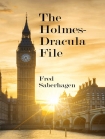A Sharpness On The Neck (Saberhagen's Dracula Book 9), Fred Saberhagen [some good books to read TXT] 📗

- Author: Fred Saberhagen
Book online «A Sharpness On The Neck (Saberhagen's Dracula Book 9), Fred Saberhagen [some good books to read TXT] 📗». Author Fred Saberhagen
I relied upon hypnosis, aided by a judiciously measured dose of a certain peculiar substance left over from the Borgia pharmacology (at its most productive three hundred years earlier), to make sure that my brother was properly entranced. His mind was programmed, as it were, to experience a number of unpleasant dreams, or more precisely one dream only, repeated and repeated.
As for myself, my long immunity to fear in waking life has left me, ever since my childhood, proof against nightmares in the life of sleep. Radu therefore could not hope to impose upon his elder brother the same punishment of bad dreams that I inflicted upon him.
* * *
Of one thing I could be entirely certain: Radu was going to be terribly angry when he awakened after experiencing such a penalty. Constantia thought it necessary to warn me of the fact. But I shrugged, and reminded her that when my errant brother got out of his partitioned coffin, he was going to be murderously angry anyway, at me and at the world. Homicidal animosity was his ordinary state. And I could not make his state of mind my chief concern. Even had it been possible for me to disregard my oath to our father, simple justice required that he be punished for his misdeeds. Of course with authority came responsibility. Chastisement, sometimes severe, was not only permissible, it was sometimes required under the terms of my promise—with the proviso that any correction always stopped safely short of capital punishment.
Have I forgotten to mention that a beating with a wooden cane was also part of the just punishment inflicted? I had employed that method several times, on earlier occasions, and had gained no permanent advantage thereby. At each impact, my cowardly brother screamed unashamedly with pain and fear—the beating naturally took place at a time when his lungs were still connected to his mouth, and the nerves of his spinal column to his brain. At intervals between screams (well, he knew how I detested screams, and I am sure he meant them to annoy me!), he sobbed that he had seen the light, and was now determined on reform. Even had that claim been true—and I knew better than to believe it—it would have had no bearing on the justice of the ongoing punishment.
The chronic difficulty which I faced was that the culprit would heal with great rapidity from any physical punishment I might inflict—anything short of the ultimate and forbidden sanction of the great true death.
* * *
In any case, I found the news that Radu had returned to the world in 1790 vexing, to say the least.
Mentally reviewing my available options in dealing with my younger sibling, I found that they were, as before, severely restricted by the vow our father had extracted from me as an adolescent.
Father had been satisfied, even pleased, by my willingness to pledge my honor in the cause of duty.
Following my own version of the Golden Rule, I thought that for my own sake I had better locate Radu, if that was at all possible. Before he located me.
I confess that I began the effort with no methodical plan. For a time my chief hope was to run across some lesser vampire who might give me a clue as to where Radu could be found. Still, I more than half expected to discover my brother himself gloating over fresh corpses, the day’s harvest of Sanson’s guillotine. Of course the blood so prodigally wasted there would be stale, chill, clotting, well past its peak of flavor and nourishment. But there would be in what was left a tang of despair, of ultimate fear. It was suffering, and the evidence of suffering, that attracted Radu more than blood.
Actually Radu could tell, by the shadings of flavor in the blood, that some of these condemned had gone to their doom tranquilly, at peace with the world that was about to eject them. Or at least he had convinced himself that it was so.
* * *
In 1792, beginning a methodical attempt to locate my younger sibling, and knowing his penchant for cities, the bigger the better, I thought I could not do better than to spend some time in Paris, then indisputably the greatest metropolis of Europe. I had not visited France for some time—there is something in widespread and oppressive poverty that depresses the spirit of the onlooker.
During the last decades of the eighteenth century it had appeared to me, as it did to many another observer, that a great social upheaval impended in France. Since 1789 I had been convinced that something of the kind was imminent. I think my claim as I make it now is not mere hindsight. A society of such archetypal injustice and widespread desperation was doomed to fail. The monarchy was stupid and inert, oppressive accidentally and lazily rather than efficiently. Everyone who had eyes to see and ears to hear, and who thought about the matter at all, must have seen that the old world was straining and struggling to give birth to something new. But until the fall of the Bastille in 1789, and the virtual imprisonment of the king and queen which soon followed, I, and many others, had not bestowed on these phenomena the attention they deserved; we nosferatu tend to believe that politics and social structures among the breathers have only marginal effect upon our lives. The truth is that I viewed the impending cataclysm rather smugly as regards its effect upon myself.
How wrong I was.
* * *
The sprawling palace of the Tuileries,





Comments (0)